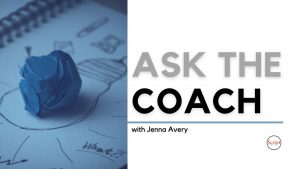
by Jenna | Feb 23, 2021 | ScriptMag Articles
My new “Ask the Coach” column on Script Mag launched this week!
As a writing coach, I answer a lot of questions for writers about how to make the work of writing actually happen. As you may already know, I specialize in helping writers get out of their own way and back on track with what they were put here to do.
In this monthly column, I’ll be answering your questions, anonymously, about navigating the ups and downs of writing, being a writer, and living a writer’s life, specific to your unique circumstances.

This is a judgment-free, guilt-free zone. It doesn’t matter what you have or haven’t done, so far.
What matters is what comes next. Ask me your most pressing questions, and my goal will be to help find a solution that works for you.

For a sampling of topics writers often ask about and to submit your own question
read the article on Script Mag here:
Ask the Coach: Your Writing Questions, Answered

Photo by Olya Kobruseva from Pexels

by Jenna | Aug 4, 2020 | Final Draft Articles
Last week I wrote a piece for the Final Draft blog about 7 creative strategies to survive distance learning AND keep writing this fall.
Like many parents, school is majorly on my mind right now, so I’ve been thinking about how best to work with the situation as best I can. One thing I didn’t include in the article (and maybe should have) was how my husband and I are already dividing up the week into a split schedule so we each have solid chunks of protected work time. We’ll adapt that more as we move into the school season.

“The goal is simply to move forward. The goal is to progress, however slowly, in a productive direction. It is the realization that this is, now more than ever, a game of inches and not of miles.”
— Chuck Wendig

With many school districts here in the U.S. planning to open this fall with “full distance” or “hybrid” learning in short order, many writer-parents are anxiously wondering how to keep working their day jobs — let alone keep writing and preserve our well-being — on top of being full-time educators. (And even if you’re not in the U.S., let’s face it: writing and parenting always requires creative planning to pull off, so hopefully this is useful to you, too.)
As someone who has been working from home since 2002 (I’ve kept my business running through my two boys’ early childhoods; they’re now 6 and 12), I’ve come into this situation knowing firsthand how frustrating it can be to try to eke out time and space for work and writing in the midst of taking care of children. And managing distance learning only complicates the care.
Having said that, I also know it’s possible to continue to write, even when pressed for time, energy, and mental bandwidth.
Let me share with you a few things I’ve learned over the years.
Read the article on the Final Draft blog here —> 7 Creative Strategies to Survive “Distance Learning” and Keep Writing This Fall

Image credit: Photo by Ketut Subiyanto from Pexels

by Jenna | Jun 14, 2017 | Writing Articles
It's that time of year again... summer!
The days are getting longer, the weather is warmer, kids and teachers are out for the summer, and vacation season is here. There are so many reasons to put down your pen and turn off your computer and go outside... which I highly recommend.
All work and no play isn't good for a writer's soul, after all.
And, at the same time, you'll want to keep writing so you don't lose your writing momentum or end up finishing summer feeling disappointed about where you are in your draft.
Here are five tips for making the most of your summer writing, while still enjoying the play time you need and deserve.
#1. Remember Why You Love Writing
While it's highly useful to treat your writing with as much care and attention as you would a professional job... when we're in the middle of this expansive summer energy, it's a good time to remind ourselves that we're also doing this because we LOVE it.
This helps create a more natural fit between the part of us that wants to have delicious summer adventures and the romantic side of our writing dreams. To that end, even while you're putting your head down to write, play with matching your summer energy to your writing energy. You might light candles while you work, write in a café, or take your notebook to the beach. This is a great time of year to indulge your most vivid writing life dreams and make it fun.
#2. Be Aware of Magical Thinking
Over the last couple of weeks as I've developed our summer plans, I've found myself imagining doing a big chunk of writing on one of our vacations... And doing a big chunk of studying on one of our vacations... And maybe writing some promotional copy on one of our vacations.... and all of these on the SAME vacation. Talk about magical thinking! Even if I actually wanted to write and/or work during a trip (I don't), I certainly can't accomplish all of those things and have the time I want to have with my family. Sure, I could probably finagle an early morning writing session before they awaken, but I want my vacation for vacationing.
Similarly, it's easy to imagine that you'll have so much extra time during the summer that you'll be able to make wild progress on your work. I think this might be a holdover from when we were all in elementary school and summers seem to last forever and we have nothing to do... just the way we imagine that a new year will suddenly have so much more free time than we had in the last one. But we don't. Even if you're a teacher with the summer "off," your days will quickly fill with all the things you've put off doing during the school year unless you're mindful about it.
Instead, be realistic about what you can actually accomplish over the course of a summer. See how many days you have to write, and schedule them accordingly with your summer writing goals.
#3. Give Yourself Time to Play
We're way more likely to do our work when we're also giving ourselves time to play, rest, indulge, and enjoy. And since summer naturally lends itself to those things, it helps to set up a nicely balanced bargain between the two.
I find that writing as early as possible during the day allows me to have guilt-free down time and playtime in the afternoons, just as I find that when I'm writing when I'm home, I feel good about enjoying my vacations fully while I'm away instead of feeling guilty that I "should" be doing more.
Work hard, play hard, is an adage that fits the bill here... but you have to actually deliver on the play time to make this work.
#4. Plan for Reentry
Taking time off from writing -- generally anything more than 1 to 2 days off -- tends to create a bumpy "reentry" back into it. So if you go away for a long weekend or a vacation, think about how you'll reboot yourself with your writing when you get back.
In my community, we advise our writers to "go back to the beginning" of working in small increments of writing time if resistance kicks in when it's time to pick the writing back up. A little accountability goes a long way here too (we offer this in the writing community if you need help).
So if you return from time away and find yourself struggling to get back into your book (or script), try writing for just 5 to 15 minutes to jump start yourself again. You can increase the time over the coming days as rapidly as feels doable to you until you're back to your normal routine.
Use this guideline: The more resistance, the smaller the amount of writing time.
#5. Have Fun, and Be Ready for Anything
Summer can be an "all bets are off" season. Between kids at home, weather variations, vacations, out of town guests, extra summer projects, and our own impulses to celebrate the summer, a lot can get in the way of writing.
The more you can be ready to roll with it -- to have fun with it even, like you're playing a "I wonder how much writing I can pull off this summer" game -- the easier it is.
I find that a lot of this is about your mental attitude -- if you're expecting your summer to be just like the rest of the year, you're more likely to get thrown off track. On the other hand, if you take an attitude that things are going to be more up in the air, you'll be more ready to take the writing time when it comes and just run with it. You'll also be more likely to have contingency plans ready to go if something comes up, like having a portable writing kit, a flexible schedule, or a backup writing time slot later in the day if your morning writing gets interrupted.
Have fun, writers, and happy summer!
You may also like:

by Jenna | Dec 20, 2016 | Guest Posts
It's December, the end of the year. In a continuation of my goal to help you Start 2017 Off Write, I thought you might like to meet some of my community members and get a look inside their writing lives. We'll kick off this series with Rebecca Brams, a local Berkeley writer and longtime writing community member.
Meet Rebecca Brams: Mama, Grant Writer, & Novelist
Rebecca is a Berkeley mom of two boys (we have both of those in common!) and she's writing a novel alongside parenting and the grant writing work she does. She has been a writing community member for three years. I invited Rebecca to tell us more about her writing and her writing life.
 What kind of writing do you do, and where are you in your process?
What kind of writing do you do, and where are you in your process?
I do several different types of writing, including grant writing for non-profit clients, personal essay, short fiction and blog. I mainly use the writing community for my novel work — I’m writing a trilogy of historical fiction novels set during the Inca Empire, in what is today Peru. Since I joined the writing community three years ago, I’ve written a draft of the first book in the trilogy and put it through a story analysis process including reverse outlining and mapping. I used two story analysis methodologies: Save the Cat and The Story Grid. I'm now partway through revising the novel. (If you’re curious about the novel trilogy, you can learn more about it in an essay Rebecca published here.)
How has your writing practice changed since you've been in the writing community?
I've become much more productive and stay on track more easily. I’ve been part of different kinds of writing communities over the years, including when I got my MFA degree, and I’ve found different types of value in each experience. The writing community is unique because of the daily check-in and because of the focus on process, not content. I know that if I get stuck, my coach will offer me a different perspective, and I often use the coaching calls to help me work through issues that come up. Being in the writing community makes me feel like I’m part of a writing community that’s “got my back” and will help get me back on track when I become overwhelmed or lose focus.
What have you learned about yourself as a writer?
I've learned to trust the ebb and flow of the creative process. Recording my progress on a daily basis (and seeing my fellow writing community members do the same) has shown me that I can have a fabulous writing day, followed by a humdrum day, and then get back into the flow again in my next writing session. Now when I have a tough day or hit one of those “stuck” spells, I worry less because I’ve realized it’s a normal part of the creative process.
Also: This is life. This is it. Every day we create it with our choices. Every day we choose to write even though urgent things are calling us, we honor our creativity, the Muse, and the unique voices that can only speak through us. Every day we choose to be gentle with ourselves, we create a life of compassion and peace. These two elements can feel in opposition to each other, but perhaps allowing for the coexistence of opposing forces is necessary for a rich artistic life.
How much do you write and where do you typically write?
I try to write early in the day, usually right after I drop my kids off at school, before lots of other to-dos pop up. That probably happens three to five days per week, depending on whether there are school holidays, my husband's work travel schedule, or if I have a lot of client work. I usually work at home, but sometimes I mix it up by going to a café. About once a week, I go to an in-person writing group.
When I’m at home, I often work at my secretary desk in my bedroom, but when I’m deep into line-edit revisions, I find I work better sitting in bed or on the sofa -- it gets me more into the mindset of a reader. When I’m strapped for time and trying to get in a sliver of writing, I will sometimes even write in my car. My coach has called me a “time-stealing ninja” for the different ways I’ve managed to slide writing into a busy schedule over the years.
What does a successful writing day look like for you?
It used to be that 15 minutes a day was all I tried for. Now my minute goals range a lot more depending on what else is happening in my life. I’d love to work for an hour a day or more, but there are so many different elements in my life that it really depends. Locking myself into a rigid schedule tends to lead to stress and guilt. I try for consistency and keeping up momentum more than getting the same amount of time in every day. And I do writing retreats -- often solo weekend retreats -- to immerse myself and get in big chunks of time.
What's next for you with your writing?
My big writing goal for 2017 is to finish the second draft of the first book by the beginning of the summer when my kids get off school. It’ll be a stretch, but I'm going to give it my best shot with the help of the writing community.
Community Profile
 Name: Rebecca Brams
Name: Rebecca Brams
Roles: Grant writer, novelist, blogger, essayist, mother of two boys
Location: Berkeley, California
Genre: Historical fiction
Current writing goal: Finish second draft of novel by June 2017
Biggest writing challenge: Juggling priorities, the unpredictability of young children
Biggest writing ah-ha: Starting is almost always the hardest part.
Go-to writing platform: Scrivener
Favorite writing spot: In bed!
Bio: Rebecca Brams is a writer and mother to two young boys in Berkeley, California. She grew up in California’s Mojave Desert and has traveled extensively in Latin America. She has a B.A. in Anthropology from Stanford University and an M.F.A. in Creative Writing from St. Mary’s College of California. Her fiction and creative nonfiction have been published in Carve Magazine, Literary Mama, Dark Matter: Women Witnessing and on blogs, including her own, https://rebeccabrams.com.

by Jenna | Feb 20, 2013 | Writing Articles
Back in November 2011, I wrote a post about why I’ve been getting up at 6 a.m. to write. It’s something I often encourage writers to try, especially those that are struggling with resistance and / or struggling to find time to write.
In my writing community, one of our writers found a study showing that your optimal creative time may actually be the opposite of your peak cognitive time. It’s sparked quite the discussion and has inspired some of our members to give morning writing a try. I have it in my mind to write a guide to morning writing, and I thought I’d start off with an article about it first.
The basic principle
The basic principle of writing first thing in the morning is that it’s about doing the hardest work first.
And by “hardest,” we don’t necessarily mean the most difficult, though it may match up.
We’re talking about doing the work that triggers the most resistance at your first available opportunity.
What does “first available opportunity” mean?
When I first started writing daily with Called to Write, my routine was that I would take my son to preschool, get back to my desk around 9 a.m. — my theoretically first available opportunity — and then write. Except not. Because I kept getting sucked into email and work. It was during work hours, and I felt hard pressed not to be focused on income-generating activities.
At least that was the story I told myself.
The deeper truth is that once I was awake for that many hours, my fear — as represented by my inner critic — was a heck of a lot louder by that point in the day when I was fully awake.
So I decide to try the morning writing gig and see how it felt. As an experiment.
Why it’s advantageous to write first thing in the morning
I first came to the notion of morning writing after reading about several writers that swore by it. Since they were pros, I figured they must know something that I didn’t. So I thought I’d give it a whirl and see how it went.
Here’s what I found:
- The longer I’m awake, the more opportunities I have to procrastinate. Writing first thing helps me circumvent my natural tendency to avoid the very work I’m called to do.
- My inner critic is much, much more quiet first thing in the morning. I don’t have to work so hard to keep those gremlins at bay when I’m still sleepy.
- Because I’m writing regularly, it doesn’t take more than a minute to find my place in my work from the previous day and start writing again.
- I spend the rest of the day in a greater state of calm because I’ve met my goal for the day. It doesn’t hang over my head, nag at me, or make me feel guilty if I haven’t done it yet.
- I’m wasting a lot less time doing meaningless things at night because I’ve adjusted my sleep schedule to get up earlier.
Common objections to writing in the morning
Whenever I mention this idea to writers — usually the ones struggling most with resistance and procrastination or time management — the most common objection I hear from people is that they are “not morning people.” And it seems like people have natural rhythms they’re naturally drawn to.
The funny thing is that I can tell you truly, I am not a morning person. When I first started my coaching practice, I was delighted to realize I could start my days whenever I wanted to — which was late. I loved the fact that I didn’t have to set an alarm clock and that I could schedule my first clients at noon. I loved sleeping in late and staying up late. It fitted with my natural rhythm.
Now, however, I love being up earlier in the day.
I love the fact that I can get so much done before 10 a.m. and feel like I have the whole day ahead of me.
I also love going to bed earlier (lights out by 9:30 is the target), because I use my awake hours much more wisely. (And by the way, I suspect there wouldn’t be so many night owls if we weren’t “biased” by electric lights.)
Things to keep in mind as you shift your schedule
If you decide to give morning writing a go, here are a few things to keep in mind.
- Start by setting an alarm clock for 30 minutes earlier than your standard wake up time, then push it 20 to 30 minutes earlier each day until you hit your target.
- Also give some thought to how much writing you want to do each day. You’ll be able to gauge how early you want to get up depending on your writing goals for the day (and remember, as we teach in my writing community, it’s perfectly okay to work in small increments — even 5 to 15 minutes a day is great, especially as you’re building the habit.)
- I’ve found that it’s easier just to be tired for the first few days and to go to bed early those nights to help myself make the shift. At least for me, it just prolongs the discomfort if I decide to sleep in a few days, take naps, or otherwise try to make the change gradual.
- Be clear that you will need to go to bed earlier to make this work. I’ve seen other writers still trying to burn the midnight oil AND get up at dawn. That’s ultimately a drain on your creative well, and you won’t be able to run on empty for long. So determine how many hours of sleep you need, and do the math so you know what time you need to go to bed.
- Give yourself about one to two weeks to get used to the change. It doesn’t happen overnight.
It’s a grand experiment
As you embark on this, think of it as an experiment. See what you notice about how you feel about your work and what you notice about your stress levels during the day after you’ve done your writing. You won’t really know if it works for you or not until you try it.

![]()
![]()






 What kind of writing do you do, and where are you in your process?
What kind of writing do you do, and where are you in your process?